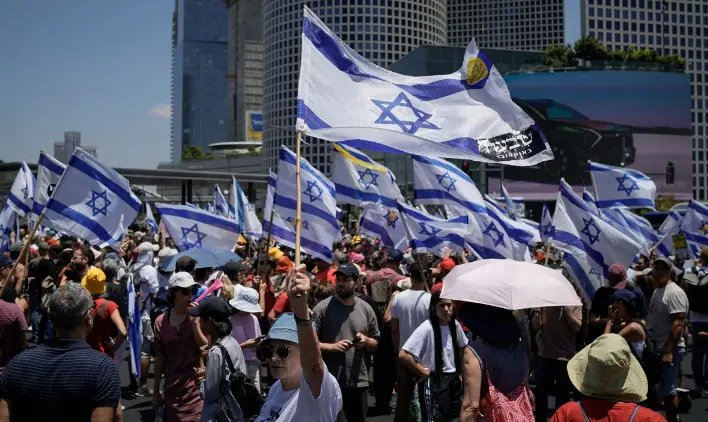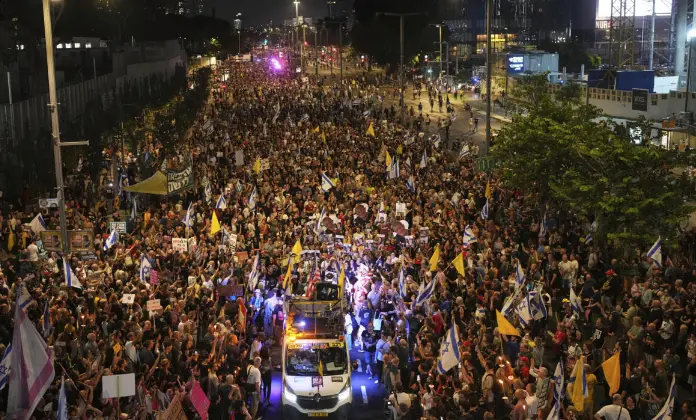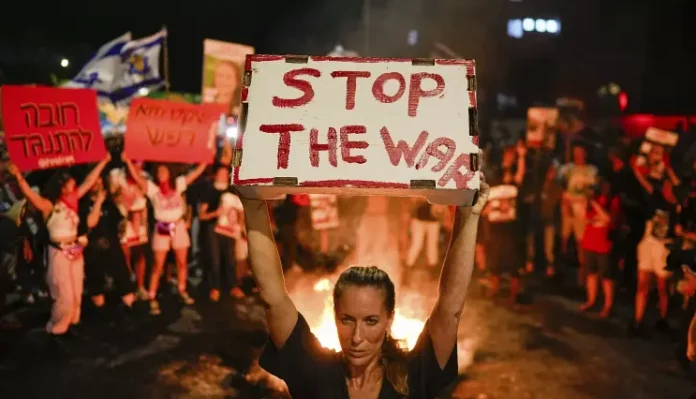Tens of thousands of Israelis gathered in Tel Aviv and across the nation in August 2025 to demand an immediate end to the Gaza war. The protests, fueled by rising frustration, included a nationwide strike, calls for a ceasefire, and pressure on Netanyahu’s government to negotiate a hostage deal.
KumDi.com
Tens of thousands of Israeli citizens took to the streets of Tel Aviv in August 2025, leading one of the largest anti-war demonstrations in the nation’s recent history. The Tel Aviv protests against the Gaza war reflect growing frustration with the government’s military strategy, demanding a ceasefire, hostage release, and urgent political accountability.
Table of Contents
Nationwide Protests Shake Israel Amid Rising War Fatigue
Mass protests erupted across Israel, with Tel Aviv at the epicenter.
Hostage Square was filled with demonstrators calling for an end to the Gaza war.
The movement included families of hostages, former soldiers, and civil rights activists.
Protesters demanded an immediate ceasefire and a new hostage deal.
The demonstrations reflect growing dissatisfaction with ongoing military operations.
General Strike Paralyzes Key Sectors Across the Country
A nationwide strike was coordinated alongside the protests.
Public transportation services were disrupted in major cities.
Government offices and schools experienced widespread shutdowns.
Healthcare workers and educators joined the civil resistance.
This coordinated action was one of the largest since the war began.
Israeli Government Faces Mounting Pressure and Arrests Spike
Authorities responded by arresting dozens of protesters.
Police deployed water cannons to disperse crowds in several locations.
The government condemned the protests, calling them dangerous during wartime.
Leaders warned the protests could impact hostage negotiations negatively.
Despite the backlash, protest organizers vowed to continue.
Public Frustration with Gaza War Hits Boiling Point
Public sentiment is shifting as the war enters a prolonged phase.
Many Israelis are expressing fatigue, anger, and fear for the nation’s future.
Criticism is growing over the lack of a clear exit strategy.
Calls for government accountability and leadership change are intensifying.
Polls suggest increasing support for immediate ceasefire negotiations.

Humanitarian Concerns Escalate Over Gaza Displacement Plans
Reports of planned mass displacement in Gaza have sparked international concern.
Citizens fear the worsening humanitarian crisis will provoke further unrest.
Critics argue that forced evacuations only deepen regional instability.
The crisis has led to intensified scrutiny of Israel’s war strategy.
Aid organizations are warning of an impending famine and medical collapse.
Israeli Media and Public Disengagement Come Under Fire
Activists accuse mainstream media of minimizing Gaza’s humanitarian suffering.
Coverage of civilian casualties and hunger remains limited and biased.
This media silence is fueling frustration among protestors and civil society groups.
A growing movement is pushing for more transparent and balanced reporting.
Digital platforms are being used to bypass censorship and spread uncensored updates.
Protest Movement Grows Into Nationwide Civil Resistance
The anti-war movement has evolved into a coordinated national effort.
Protests now include labor unions, student groups, and business leaders.
The scale and frequency of demonstrations have increased over recent months.
Tactical shifts include strategic road blockades and peaceful sit-ins.
Public mobilization continues to challenge the government’s wartime legitimacy.
Netanyahu’s Leadership Faces Crisis as Protest Pressure Mounts
Prime Minister Netanyahu is facing mounting criticism from across the political spectrum.
Public trust in his leadership has eroded significantly during the conflict.
Opposition parties are calling for early elections and government reform.
Coalition partners are under pressure to reconsider their alliance with Netanyahu.
The protests are becoming a pivotal moment in Israeli political history.
What Comes Next for Israel and Gaza?
The protest movement shows no signs of slowing down.
International attention is now turning to Israel’s internal divisions.
Ceasefire negotiations may gain momentum under domestic and global pressure.
Future demonstrations are expected to grow in size and intensity.
Israel’s leadership must now weigh military goals against internal collapse.

FAQs
Why are there protests in Tel Aviv against the Gaza war?
The Tel Aviv protests against the Gaza war are driven by public anger over prolonged conflict, growing casualties, and the government’s failure to secure a hostage deal or outline an exit strategy.
What triggered the August 2025 protests in Israel?
The August 2025 Israel protests were sparked by mounting frustration with the Gaza war, government inaction on hostage negotiations, and widespread humanitarian concerns.
How large were the Gaza war protests in Tel Aviv?
Over 100,000 people participated in the Tel Aviv protests, part of a larger nationwide strike, making it one of the most significant anti-war movements in Israel in 2025.
What are the protesters in Israel demanding from the government?
Protesters are calling for an immediate ceasefire, a new hostage deal, and political accountability from Netanyahu’s administration for its handling of the Gaza conflict.
How is Netanyahu responding to the Gaza war protests?
Netanyahu has condemned the Tel Aviv protests, warning they may hinder negotiations with Hamas, though public support for the demonstrations continues to rise across Israel.





